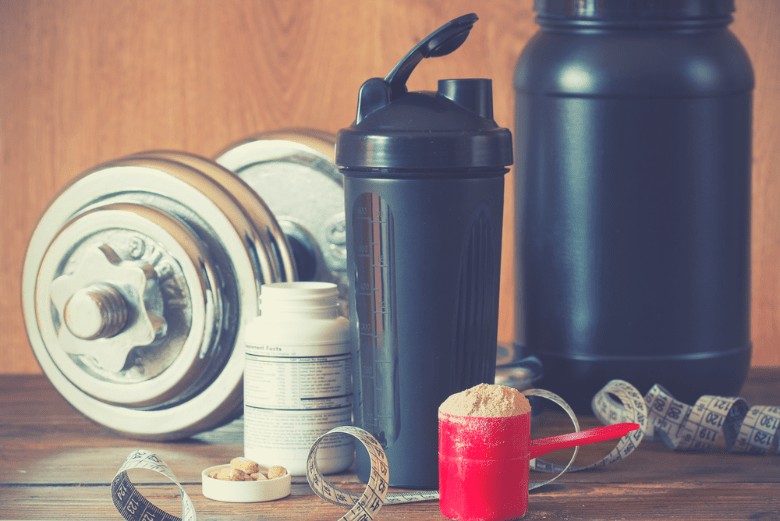I first became serious about fitness in my thirties after realizing I no longer had that naturally athletic swimmer’s body I had kept easily enough throughout my twenties.
I started hitting the gym after work with a coworker, and for a while, things weren’t going well.
At least once a week, I’d bomb out, my completely depleted muscles unable to lift another thing.
My coworker would keep right on lifting like he never even got tired. It took me a while, but I finally swallowed my pride and asked him what we were doing differently.
What Causes Depleted Muscles?
While depleted muscles can be caused by other factors such as illness, injury or dehydration, their most common cause is something called glycogen depletion.
You can check out our comprehensive guide to what glycogen depletion is and how it affects your workouts here.
If you don’t have time for details, here’s a quick overview.
Glycogen and Glycogen Depletion
Glycogen molecules are produced when you consume more carbohydrates and glucose than your body needs to immediately burn for energy.
The excess carbs/glucose are transformed into glycogen and stored in the liver and muscles.
When you exercise or perform other strenuous activities, your body pulls those glycogen molecules out of storage and burns them to produce more energy.
The longer and more aggressive your workouts become, the more glycogen molecules your body uses, leading to the process known as glycogen depletion.
Once your body has burned too much glycogen, it goes into a type of survival mode.
Your brain tells you your body can’t take anymore; you become exhausted, and you’re left with depleted muscles that feel like they couldn’t even lift a pair of chopsticks if your life depended on it.
That, in a nutshell, is glycogen depletion.
How to Avoid Glycogen Depletion and Its Effects
If glycogen depletion is caused by a severe lack of glycogen-producing carbohydrates in the body and you’re hoping to avoid glycogen depletion, the obvious answer is to ensure you consume enough carbs to stave off the depletion.
There are a few different ways you can do this.
- Adjust your diet
- Keep high-carb snacks on-hand
- Start “carbing up” a week before a big event
- Adjust your workout routines so you burn less carbs at one time
- Schedule in time for recovery and to replenish your glycogen stores
- Keep glycogen tablets on-hand for emergencies
When this kept happening to me, I tried all of these things with varying levels of success. Adjusting my normal, day-to-day diet helped somewhat.
I’d always heard it was healthier to avoid carbs whenever possible, so I didn’t eat a lot of them.
Once I learned that carbs are actually pretty essential for fitness routines, I stopped passing on the rolls at dinner and added the toast and muffins back into my breakfast.
Still, this wasn’t a total fix.
Keeping carb-heavy snacks on-hand was also helpful, but it wasn’t always convenient to take time out of my workout to move to the side and down some fruit or a power bar.
Sometimes they didn’t digest quickly enough to do much good either.
Adjusting my workouts kept me from experiencing the pain of depleted muscles, but it stalled my progress as well.
For me, I found carbohydrate supplements worked best, although I did maintain the daily intake of carbs and made sure I ate well-balanced meals that had been optimized for pre- and post-workouts.
Carbohydrate supplements, specifically carbohydrate powders, were ultimately what saved me though.
Carbohydrate Powder
What Is Carbohydrate Powder?
Carb powders are simply carbohydrates that have been reduced to powdered form to make them easier to digest and absorb.
There are multiple brands and flavors available, and the biggest, most defining difference between them is usually the base (type of carbohydrate) used to make the powder.
The three most common bases are dextrose, maltodextrin and waxy maize, but companies are constantly making new powders with different and sometimes more effective bases.
The most important qualities of any good carb powder are that it be easily digestible, quickly absorbed, free of any additives that would cause you to crash after it’s worn off and a source of powerful, long-lasting energy without giving you additional problems such as a “buzzed” feeling, heartburn or other ailments.
Carb powders are also beneficial for use during recovery periods. In fact, they can be used at every stage of a workout – before, during and after.
Taking these supplements and eating enough daily carbs prevented me from suffering from glycogen depletion and having to stop my workouts midway through because of it.
Where Can You Find Carbohydrate Supplements?
Carbohydrate powder is a fairly common supplement for athletes and lifters, so it isn’t hard to find.
You can find various brands of powder at most stores like GNC that sell vitamins, supplements, and other things of that nature.
You can also buy many brands directly from the manufacturers’ websites or find a wide selection at sports stores that sell supplements.
Need quick fuel without the calories? We recommend this carbohydrate supplement.
What Are the Benefits of Using Carbohydrate Supplements?

If you found your way to this article because you were looking for ways to combat the symptoms of glycogen depletion, then you already know one of the biggest benefits of carb powder: It helps prevent glycogen depletion and helps alleviate the symptoms of it if it does happen.
There are other great benefits as well.
Carbs and Your Muscles
Although many doctors and weight loss “experts” tell you to avoid carbs whenever possible if you’re looking to lose weight and get healthy, the exact opposite is true if you’re wanting to go beyond weight loss and start gaining and keeping larger muscles.
Carbs are, without a doubt, one of the key components to building muscle.
There are plenty of scientific studies and available research out there to back up this fact, but for some reason, most people you talk to outside of the gym will insist that you shouldn’t consume carbs.
This is simply untrue.
In simple terms, building muscle takes a lot of energy, and we already know that the body’s biggest, most powerful source of energy are carbs.
Furthermore, if you want to delve a little more deeply into the science behind it, carbs also help you retain muscle after gaining it.
That’s because carbs help prevent muscle loss. When you consume too few carbohydrates, your body begins excreting more nitrogen than normal.
Nitrogen is an important component in amino acids, which are essential to building and retaining muscle mass, and if your lack of carbs leads to larger nitrogen excretions, it stands to reason that you’re going to start noticing depleted muscles.
Additionally, as we’ve already mentioned, consuming carbs after a workout helps quickly replenish the body’s glycogen stores, and the more quickly you can replenish those stores, the more quickly your depleted muscles will begin to recover and then repair themselves.
Combined all together, these things are the reason carbs lead to larger muscles that don’t waste away quickly.
Consequently, carbohydrate supplements are the quickest, easiest and most efficient way of consuming carbs, especially during those times when you’re not really hungry or don’t want to stop working out to eat.
Carbs and Your Workouts
As we mentioned above, there are all kinds of different carbohydrate supplements.
Some are designed specifically to be consumed before a workout so that you get a nice boost of energy followed by sustained energy that should see you through the entirety of your workout.
n case you hit slumps in the middle of your workouts, though, there are also carb powders designed for consumption mid-workout so that you keep up your momentum and don’t start feeling the effects of glycogen depletion.
Finally, there are post-workout carbohydrate supplements, which are great for replenishing your body’s glycogen stores and helping repair your muscles to get you ready for your next workout.
Because there are all these different types of carbohydrate powders, you should be able to see a marked increase in the intensity and overall performance of your fitness routines.
Carbs and Recovery
This one goes back to what we’ve already discussed about post-workout carb supplements.
In addition to helping replenish your body’s glycogen stores and repairing your muscles, post-workout supplements just give you a much better recovery in every way possible.
You lose those exhausted depleted muscles and foggy mind feelings.
You feel fewer aches and pains in your muscles and joints.
Your mind will be clearer; your body will feel rejuvenated, and you’ll feel pretty great after downing a quick carbohydrate-infused drink post-workout.
Are There Any Downsides/Risks?
The biggest risk from carbohydrate supplements are to people who have trouble regulating their blood sugar.
In nearly all cases, people with diabetes/blood sugar problems shouldn’t take carb powder. There are also a few other potential negative consequences.
Can Cause Weight Gain
Carbohydrate supplements are a workout/fitness aid that can prevent depleted muscles and help combat glycogen depletion.
They are not – and I cannot stress this enough – weight loss supplements. Carb powder will not help you lose weight.
It’ll help you if you’re trying to gain muscle and tone your body, but as far as weight loss goes, this isn’t the product you need.
In fact, carb powder can potentially cause you to gain weight, so if you’re already having trouble moderating your weight, this might not be a good option for you.
Blood Sugar Levels
Everyone knows that carbohydrates and blood sugar levels go hand-in-hand.
Because of this, some scientists and researchers believe that taking carbohydrate supplements too often can have detrimental effects on even healthy people’s blood sugar levels.
This has not, however, been conclusively proven, and I, myself, have noticed no noticeable impact, either positive or negative, on my blood sugar levels since I started using carb powder.
Water Retention
Consuming too many carbs – for example, a concentrated dose of carbs via carbohydrate supplements –can cause your body to retain water.
However, this is less likely to happen if you’re participating in high-intensity workouts because you’re going to be working hard and sweating a lot.
The amount of water you’re consuming is most likely going to be expelled one way or another. Still, it’s a possibility worth mentioning.

The Bottom Line
Despite what you hear about carbohydrates being no good for your body and the cause of nearly everyone on Earth’s obesity problems (which is totally untrue, by the way) carbs are absolutely essential if you’re building muscle that you want to keep and/or are involved in a lot of vigorous exercise.
Furthermore, if you often find yourself suffering from depleted muscles, mid- or post-workout exhaustion or other symptoms of glycogen depletion, then carbs are probably going to be the only remedy that actually helps.
Additionally, carbohydrate supplements are the easiest and most convenient way for a lot of people to consume the number of carbs needed to stave off glycogen depletion and all of its unpleasant side effects.
This is especially true of people who don’t enjoy a lot of carby, starchy foods or who can’t eat those types of foods regularly without feeling bloated or otherwise uncomfortable.
Plus, there’s really no quicker way to ensure carbs get digested and absorbed than through the concentrated dose you’ll get with carbohydrate supplements.
If you’re a relatively healthy adult who isn’t actively trying to lose weight and who doesn’t have a problem with blood sugar, you might want to give them a try.



